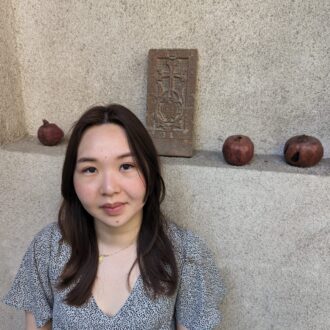Amanda Caterina Leong is the Getty Project Mongol Connections Postdoctoral Fellow and the Mongol Connections’ Project Manager. She has a Ph.D in Interdisciplinary Humanities from the University of California Merced and an MA in Creative Writing from Dartmouth College. Amanda is a specialist in the arts of the medieval and early modern Persianate world. Her research and upcoming book look at multimedia representations of female javanmardi (young-manliness) in the premodern Persianate world (945-1800) and how they can help us rethink gender, class, race, cosmopolitanism, kingship and kinship.
Amanda was the inaugural Ebrahimi Fellow for Persian Art (2023) at the Smithsonian National Museum of Asian Art. Amanda’s research has won the Middle Eastern Studies Association (MESA)’s Graduate Student Paper Award (2021), the Medieval Academy of America’s Belle da Costa Green Award for Manuscript Studies (2022), the Association for Iranian Studies’s Conference Paper to Journal Award (2022) and honorable mention in the Central Eurasian Studies Society’s Graduate Student Paper Award (2022). Amanda’s research has also been supported by the American Institute of Iranian Studies, the University of California Humanities Research Institute, the Middle East Medievalists, and the Society for the Study of Early Modern Women and Gender.
Amanda is part of the editorial team at Ajam Media Collective and the board of directors for the Association for the Study of Persianate Societies. She is also the co-founder of the Interdisciplinary Persianate Group with Professor Sholeh Quinn at UC Merced. Prior to teaching at the Courtauld, Amanda has taught in Dartmouth College, New York University Abu Dhabi, UC Merced and the Macau University of Science and Technology.
Publications
- “Chinese Women as Symbols of Javānmardī in the Illustrated Manuscripts of the Medieval Persianate World” (forthcoming), Expanding Contexts, Shifting Horizons: Essays from the 8th Biennial Symposium of the Historians of Islamic Art Association in Houston, edited by Aimée Froom and Farshid Emami. New York and Leiden: Brill.
- “‘I’d rather be married to someone I can control’: Female Javānmardī in Gulbadan Begum’s Humayunnamah as a Mirror for Princesses” Iranian Studies (2024), 1–24. https://doi.org/10.1017/irn.2024.49
- “If only that pitiless blade had pierced my own heart and eyes”: Mughal Royal Women’s Grief as a Form of Political Rhetoric” in South Asia: Journal of South Asian Studies (August 2024: Volume 47, no.4), July 9, 2024, https://doi.org/10.1080/00856401.2024.2366633
- “How to Quarantine: Lessons from a 19th century Qajar Iranian Prince” published in Ajam Media MC, https://ajammc.com/2021/07/05/how-to-quarantine-qajar-prince/ (peer-reviewed)
- “How Iranian Princess Taj al-Saltana Saw a 19th Century Global Pandemic” published in Ajam Media MC, https://ajammc.com/2020/11/15/taj-al-saltana-global-pandemic/ (peer-reviewed)
- “Hope for Middle East Reforms” and “امید برای تحول در خاورمیانه: بازبینی حمله ۱۳۵۸ به مسجدالحرام٬ چهل سال پس از واقعه” published in IranWire, https://iranwire.com/en/blogs/26/6562, https://iranwire.com/fa/blogs/215/34873
- “Home is Being Able to Go Back” published in the Chicago Review of Books’ Arcutus Magazine, https://arcturus.chireviewofbooks.com/home-is-being-able-to-go-back-d3d3bd637fcb
Research Interests
- Sino-Iranian connections
- Animal and human
- Body histories, gender, eroticism and sexuality
- Persianate female centered curatorial practices
- Persianate female intellectual exchange and network
- Persianate female patrons and artists
- Female travel in the premodern Persianate world
- Food, medicine and science in relation to Persianate women






